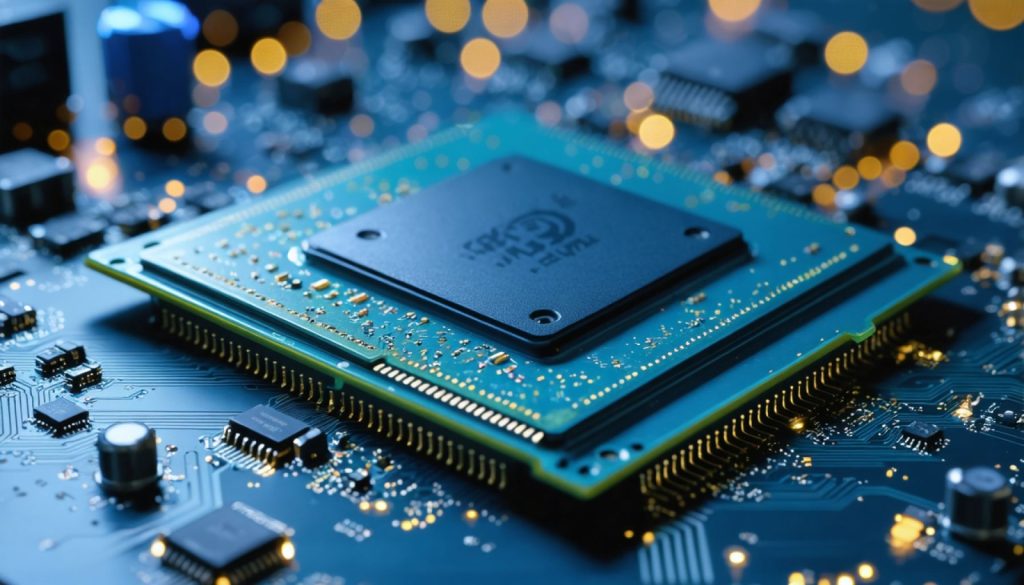
- Nvidia faces a potential $5.5 billion revenue loss due to new U.S. licensing mandates restricting advanced AI chip sales to China, Hong Kong, and Macau.
- Initially revolutionizing the gaming industry, Nvidia’s chips are now crucial in advancing artificial intelligence, powering companies like OpenAI and Google DeepMind.
- The U.S. aims to restrict chip exports to prevent bolstering China’s defense through advanced AI applications.
- Nvidia’s previous strategy of selling downgraded chips to China is undermined by new licensing demands.
- DeepSeek’s acquisition of Nvidia GPUs and alleged ties to military research heighten U.S. anxieties over strategic AI development.
- Nvidia pledges significant investments in U.S. AI infrastructure amid geopolitical tensions, contemplating a $500 billion domestic growth commitment.
- Rival firms, including Huawei, are developing AI chips, potentially reshaping the Chinese market landscape in Nvidia’s wake.
- Nvidia epitomizes the convergence of technological innovation and geopolitical maneuvering in the evolving AI sector.
Nvidia, the titan of semiconductor innovation, now finds itself at the heart of a geopolitical maelstrom that underscores the perilous intersections of technology and global politics. Recent U.S. licensing mandates aim to curb the sales of Nvidia’s advanced AI chips, the H20s, to China—including Hong Kong and Macau—halting shipments and blindsiding the company with a potential $5.5 billion revenue loss due to stranded inventory.
Once upon a chip, Nvidia hewed its path in the tech world through its groundbreaking graphics processing units (GPUs) that transformed the gaming landscape. Fast forward, and these chips have transcended gaming, becoming engines for artificial intelligence (AI) breakthroughs. By the 2010s, Nvidia’s technology was fueling the burgeoning AI industry, underpinning projects from globally renowned firms such as OpenAI and Google DeepMind.
Yet, China’s tech powerhouses—Tencent, Alibaba, ByteDance—had also harnessed Nvidia’s sparkling technological prowess. As tensions escalated between Washington and Beijing over technology and its strategic applications, Nvidia’s substantial enterprise in China became a contentious battleground.
Official U.S. concerns ring clear: Advanced chips could unwittingly fortify China’s defense capabilities—autonomous weapons, omnipresent surveillance, and cyber warfare. The Biden administration’s crackdown on semiconductor exports built upon its predecessor’s resolve, amplifying the restrictions Nvidia now grapples with.
Crafty maneuvers like creating “downgraded” chips specifically for the Chinese market once kept Nvidia in the game. The new requisites, however, demand licenses even for these less potent iterations—marking a sharp pivot in diplomatic and economic policy that puts Nvidia’s presence in the Chinese orbit under siege.
DeepSeek’s rise—an enigma starring in this international drama—heightens apprehension. This firm reportedly sourced thousands of Nvidia GPUs through third countries, leveraging distillation techniques and, strikingly, confidential data to craft cost-effective AI solutions. Its rapid ascent, rumored ties to military research, and implications for strategic AI development ignited alarm bells in U.S. corridors of power.
As the Trump administration tightens the noose on DeepSeek and chip giants like Nvidia, the ripples are broad—a saga blending tech innovation, national security, and economic strategy. Nvidia, now pledging investments and manufacturing mandates within American borders, faces a stark new era. U.S. lawmakers spotlight the potential of domestic growth as Nvidia contemplates a $500 billion investment in AI infrastructure, marking a homeward journey fraught with both challenge and opportunity.
Challengers rise, including Huawei crafting its own AI processing chips to vie for dominance in Nvidia’s potential absence from the Chinese market. As policymakers on both sides of the Pacific rake through the strife, the future of AI technology stands as uncertain as it is promising.
What unfolds isn’t merely Nvidia’s immediate plight; it’s a global stage where the symphony of intellectual property, technological prowess, and geopolitical maneuvering will orchestrate the next movement in the AI revolution. Nvidia, now more than a maker of high-performance chips, emerges as a representation of all that intertwines business acumen with political grit—a testament to the era where technology defines territorial aspiration.
In this transforming landscape, Nvidia must outpace more than competitors; it must navigate the choppy waters where innovation meets regulation—where the chips truly count. As the world watches, Nvidia’s journey to redefine its path promises lessons on resilience, adaptation, and the ceaseless march of technological ambition.
Nvidia’s Murky Geopolitical Waters: Exploring New Terrains in AI and Chip Manufacturing
Navigating the Geopolitical Storm: Nvidia’s Dilemma
Nvidia, a powerhouse in semiconductor innovation, recently found itself entangled in geopolitical complexities. The U.S. government has placed restrictive licensing mandates on Nvidia’s advanced AI chips, the H20s, restricting their sale to China, including Hong Kong and Macau. This unexpected regulation has the potential to incur a staggering $5.5 billion in revenue losses for Nvidia, disrupting not only their market strategy but also impacting the global AI landscape.
The Origins and Evolution of Nvidia’s Market Influence
Nvidia initially rose to prominence by revolutionizing the gaming industry with innovative GPUs. However, the company evolved beyond gaming, becoming integral to AI advancements. By the 2010s, Nvidia’s chips powered AI projects by major players like OpenAI and Google DeepMind. This growth and versatility, however, also gained the attention of China’s tech giants, such as Tencent, Alibaba, and ByteDance, making Nvidia a key player in the intersection of technology and innovation between these global superpowers.
Security Concerns and Strategic Restrictions
The U.S. government fears that Nvidia’s advanced chips might bolster China’s defense capabilities. This includes advancements in autonomous weapons, enhanced surveillance technologies, and cyber warfare capabilities. The Biden administration’s stringent export restrictions on semiconductors build upon measures from the Trump administration, compounding Nvidia’s challenges in maintaining its foothold in China.
Nvidia’s Response and Future Strategies
In response to previous restrictions, Nvidia maneuvered by producing “downgraded” chips tailored for the Chinese market. However, the current mandates require licenses for all chip variants, signaling a critical shift in U.S. technology policy toward China.
Nvidia pledges to invest domestically, aligning with U.S. lawmakers focusing on boosting the country’s tech ecosystem. A proposed $500 billion investment plan targets the enhancement of U.S. AI infrastructure—an ambitious initiative poised to drive Nvidia’s future growth within North America.
Potential Market Trends and Predictions
1. AI and Semiconductor Industry Trends:
– Increased competition from Chinese firms like Huawei, which is developing its own AI processors.
– Accelerated investment and innovation in the U.S. semiconductor industry as firms seek to reduce dependency on uncertain international channels.
– A shift toward localized manufacturing and supply chains to mitigate geopolitical risks.
2. Implications for Global Tech Competition:
– Emergence of new players and partnerships in the AI and semiconductor sectors, aligning with national interests and strategic objectives.
– Potential increase in research and development funding in U.S. firms to counterbalance China’s growing tech capabilities.
Addressing Common Reader Questions
How are the geopolitical tensions between the U.S. and China affecting Nvidia’s market operations?
Nvidia is currently facing limited access to the Chinese market due to U.S. government restrictions, requiring new licenses to ship their widely used AI chips to this region, affecting revenue and strategic market presence.
What is DeepSeek’s involvement in this situation?
DeepSeek reportedly acquired Nvidia GPUs through indirect routes, raising concerns due to its possible affiliations with military research and the construction of cost-effective AI solutions, prompting U.S. government scrutiny.
Actionable Recommendations
1. For Investors:
– Monitor Nvidia’s domestic strategies and international policy changes to navigate investments wisely.
2. For Technology Enthusiasts:
– Stay updated on AI advancements and new technological partnerships that might arise due to shifting geopolitical circumstances.
3. For Industry Analysts:
– Evaluate the impact of regulatory changes on Nvidia’s market strategy and the broader implications for global tech dominance.
For more updates on technology and global market trends, visit Bloomberg.



